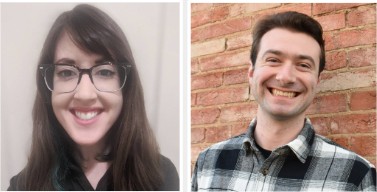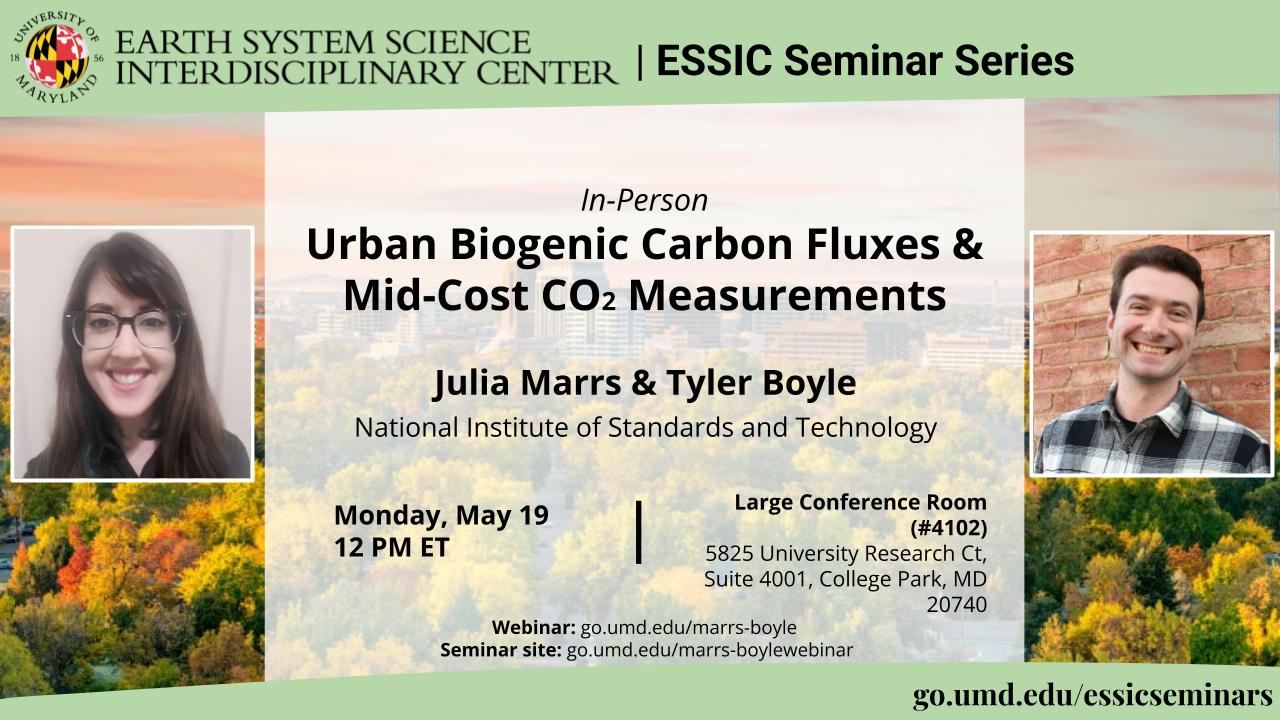
Urban Biogenic Carbon Fluxes & Mid-Cost CO2 Measurements
Julia Marrs & Tyler Boyle
National Institute of Standards and Technology
Monday May 19, 2025, 12 PM ET
In-Person Seminar Info:
This seminar will be presented by Julia Marrs and Tyler Boyle, each covering a subtopic of 20 minutes. It will take place at noon in Rm 4102 of ESSIC, 5825 University Research Ct. College Park, MD 20740. In-person attendance is welcome, with refreshment provided. Zoom is also provided for virtual participants.
Please click here to RSVP
Abstract:
Subtopic-1: Urban Biogenic Carbon Fluxes: Measurements, Models, and Mismatches
Quantifying biogenic carbon (C) fluxes from vegetation and soils in urban areas is crucial for developing accurate C budgets for cities. Here we will highlight ongoing activities aimed at measuring and modeling urban biogenic C fluxes, with a focus on two NIST experimental measurement sites. The Forested Optical Reference for Evaluating Sensor Technology (FOREST) site is a 1-hectare forest plot instrumented with a dense network of C flux sensors, complementing a proximal solar-induced fluorescence (SIF) system designed to remotely monitor photosynthetic C uptake. The Turf for the Urban Respiration Fraction (TURF) site was established to characterize managed turfgrass lawns – a highly productive, ubiquitous land cover in developed areas that has only recently begun to be characterized in C flux models. Comparisons of modeled turfgrass C fluxes from the Vegetation Photosynthesis and Respiration Model (VPRM) and in situ C fluxes, measured with chambers and an eddy covariance flux tower, will be presented alongside an investigation of management effects that may drive model-measurement mismatches.
Subtopic-2: Leveraging Low- And Mid-Cost Sensors To Measure Ambient Greenhouse Gas Concentrations
Low- and mid-cost air quality sensors offer a practical and cost-effective solution for monitoring greenhouse gases (GHG) in urban environments, thanks to their compact form and affordability, which enable dense deployment across diverse locations. However, their accuracy is limited due to meteorological impacts and temporal drift, posing challenges for transforming concentration data into reliable emission estimates. This talk will discuss NIST’s plan to deploy mid-cost CO₂ sensors in a hybrid network in the greater metro DC area, and how lab and field-based calibration methods are used to improve sensor performance. We will also introduce our custom, modular sensor package—designed for flexibility and scalability—and demonstrate how a microservices-based software architecture supports seamless sensor replacements and ensures consistent, high-quality data collection in the field.
Biosketch:
Julia Marrs is a biologist in the Greenhouse Gas Measurements Program at the National Institute of Standards and Technology (NIST). Her recent work has focused on the use of tower-based solar-induced fluorescence (SIF) sensors to study leaf-level partitioning of absorbed light by plants across spatial and temporal scales, quantifying sources of uncertainty that can hinder accurate measurements the faint and dynamic SIF signal, and estimating of carbon fluxes from vegetation in urban areas throughout the Northeast U.S. using the Vegetation Photosynthesis and Respiration Model. She previously worked as a National Research Council postdoctoral research associate at NIST. She holds a Ph.D. from Boston University, an M.A. from City University of New York Hunter College and a B.A. from Barnard College.
Tyler Boyle is an instrumentation and Internet of Things (IoT) specialist with the National Institute of Standards and Technology (NIST) Greenhouse Gas Measurements Program. His recent work has focused on uncertainty quantification and the application of low- and mid-cost greenhouse gas sensors, the design and manufacturing of robust environmental monitoring systems, and the development of scalable IoT architectures to support real-time data collection from meteorological and environmental sensors. Tyler is an alumnus of the University of Maryland, where he earned a B.S. in Atmospheric and Oceanic Science and was awarded the Tannenbaum Prize in Climate Science.
Event Information:
This is an in-person seminar with refreshments served at Rm 4102, 5825 University Ct, MD.
Event site: https://go.umd.edu/marrs-boyle
Zoom Webinar: https://go.umd.edu/marrs-boylewebinar
Zoom Meeting ID: 914 2373 7863
Zoom password: essic
US Toll: +13017158592
Global call-in numbers: https://umd.zoom.us/u/aMElEpvNu
For IT assistance:
Cazzy Medley: cazzy@umd.edu
Resources:
Seminar schedule & archive: https://go.umd.edu/essicseminar
Seminar Google calendar: https://go.umd.edu/essicseminarcalendar
Seminar recordings on Youtube: https://www.youtube.com/user/ESSICUMD

